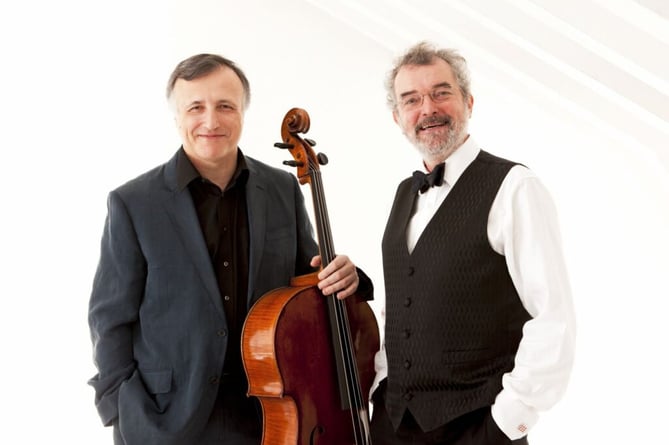Legendary duo, cellist Raphael Wallfisch and pianist John York, will give the final concert of NADSA’s 75th anniversary series of concerts later this month.
The world-class duo, who will be performing at Newton Abbot’s Courtenay Centre on April 20, have an unmatched legacy and rich history of performance of over 40 years.
It’s possibly quicker to list the cello sonatas that they haven’t performed and recorded: their discography is so extensive.
Both have their separate careers, Raphael performing and teaching throughout the world.
He holds the position of professor of cello in Switzerland at the Zürich Hochschule der Kunst. John, described as piano royalty, is a soloist, accompanist and teacher of distinction.
Newton Abbot is indeed fortunate in welcoming them for a second time; they last came to the Courtenay Centre in 2016 playing to an appreciative capacity audience.
To open and close their April 2022 concert, they have chosen to play Brahms’ two cello sonatas, the former composed when Brahms was about 30, the latter, approximately 20 years later.
Incidently, in the course of a private performance for an audience of friends, Brahms played his first sonata so loudly that the worthy amateur cellist – Gänsbacher – to whom the sonata was dedicated, complained that he could not hear his cello at all - “Lucky for you, too”, growled Brahms, and let the piano rage on.
John York has said that these sonatas are ‘so magnificent and so individual one from the other,’ that they work very well together in concert; Raphael Wallfisch: ‘They are of such intensity, and conceived on such a large scale, that they require every last morsel of your ability to play them.’
This ensemble certainly has that ability.
The composers taking up the centre of their recital will be Debussy and Beethoven.
Debussy’s Sonata in D minor is a late work, one of three sonatas for different instruments.
His intention was to compose six – the first for the cello – but with his health rapidly declining, this was not to be.
These late sonatas, returning to some kind of classical form, have more in common with his early works.
Wallfisch and York’s final choice is seven delightful variations on ‘Bei Männern welche Liebe fühlen’ from Mozart’s opera The Magic Flute. The theme is taken from the Act 1 duet of Pamina and Papageno, and was written in 1801. It will be ten minutes of melodious and playful Beethoven.
On an historical-biographical note, Raphael Wallfisch is the son of cellist Anita Lasker-Wallfisch, one of the few still living survivors of the Holocaust.
Her cello saved her in Auschwitz; she was a member of the Women’s Orchestra of Auschwitz and cellists were hard to replace.
In 1943 she was sent from there to Belsen, surviving for 6 months until its liberation in 1945.
Earlier this year, her portrait by Peter Kuhfeld – one of seven commissioned by the Prince of Wales – went on display at Buckingham Palace.
The portraits are of the seven still living Holocaust survivors who sought refuge and a home in Britain following the war.
Owing to anticipated demand, early booking for this concert, sponsored by Austins Department Store and the C & M Pike Trust is strongly advised.
All tickets must be booked in advance via the website: www.nadsa.co.uk For inqueries, call 01626 368318.




